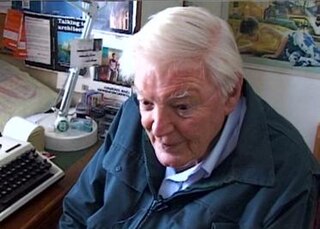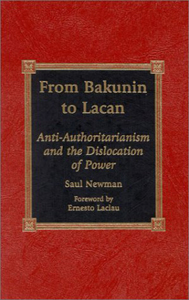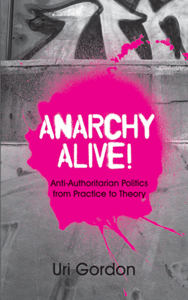
Colin Ward was a British anarchist writer. He has been called "one of the greatest anarchist thinkers of the past half century, and a pioneering social historian."
Green anarchism, or eco-anarchism, is a political philosophy and anarchist schools of thought that puts a particular emphasis on environmental issues. A green anarchist theory is normally one that extends anarchism beyond a critique of human interactions and includes a critique of the interactions between humans and non-humans as well. This often culminates in an anarchist revolutionary praxis that is not merely dedicated to human liberation, but also to some form of nonhuman liberation and that aims to bring about an environmentally sustainable anarchist society.
Anarcho-pacifism is a tendency within anarchism that rejects the use of violence in the struggle for social change, the abolition of capitalism and the state. The main early influences were the thought of Henry David Thoreau and Leo Tolstoy while later the ideas of Mahatma Gandhi gained importance. A movement for pacifist anarchism emerged mostly in the Netherlands, the United Kingdom, and the United States, before and after World War II.
CrimethInc., also known as CWC, which stands for either "CrimethInc. Ex-Workers Collective" or "CrimethInc Ex-Workers Ex-Collective", is a decentralized anarchist collective of autonomous cells. CrimethInc. emerged in the mid-1990s, initially as the hardcore zine Inside Front, and began operating as a collective in 1996. It has since published widely read articles and zines for the anarchist movement and distributed posters and books of its own publication.
Christian anarchism is a movement in political theology that claims anarchism is inherent in Christianity and the Gospels. It is grounded in the belief that there is only one source of authority to which Christians are ultimately answerable—the authority of God as embodied in the teachings of Jesus. It therefore rejects the idea that human governments have ultimate authority over human societies. Christian anarchists denounce the state, believing it is violent, deceitful and, when glorified, idolatrous. Christian anarchists hold that the "Reign of God" is the proper expression of the relationship between God and humanity. Under the "Reign of God", human relationships would be characterized by divided authority, servant leadership, and universal compassion—not by the hierarchical, authoritarian structures that are normally attributed to religious social order. Most Christian anarchists are pacifists—they reject war and the use of violence.
Anarchism in the UK initially developed within the context of radical Whiggery and Protestant religious dissent. During the English Civil War and the industrialisation English anarchist thought developed in the context of revolutionary working class politics.
Anarchism in the United States began in the mid-19th century and started to grow in influence as it entered the American labor movements, growing an anarcho-communist current as well as gaining notoriety for violent propaganda of the deed and campaigning for diverse social reforms in the early 20th century.
Libertarianism, or libertarism, is a political philosophy and movement that uphold liberty as a core principle. Libertarians seek to maximize political freedom and autonomy, emphasizing freedom of choice, voluntary association and individual judgment. Libertarians share a skepticism of authority and state power, but they diverge on the scope of their opposition to existing economic and political systems. Various schools of libertarian thought offer a range of views regarding the legitimate functions of state and private power, often calling for the restriction or dissolution of coercive social institutions. Different categorizations have been used to distinguish various forms of libertarianism. This is done to distinguish libertarian views on the nature of property and capital, usually along left–right or socialist–capitalist lines.

The anarchist philosophical and political movement has some connections to elements of the animal liberation movement. Many anarchists are vegetarian or vegan and have played a role in combating perceived injustices against animals. They usually describe the struggle for the liberation of non-human animals as a natural outgrowth of the struggle for human freedom.
Anarchism is generally defined as the political philosophy which holds the state to be undesirable, unnecessary and harmful as well as opposing authority and hierarchical organization in the conduct of human relations. Proponents of anarchism, known as anarchists, advocate stateless societies based on non-hierarchical voluntary associations. While anarchism holds the state to be undesirable, unnecessary and harmful, opposition to the state is not its central or sole definition. Anarchism can entail opposing authority or hierarchy in the conduct of all human relations.

The Australian Anarchist Centenary Celebrations occurred from 1 to 4 May 1986 in Melbourne, Australia.

Dr Joseph Toscano is a medical practitioner, a broadcaster and an anarchist who lives in Melbourne, Australia. He has become widely known as an anarchist spokesperson for the Anarchist Media Institute through his broadcasting on community radio, his frequent letters to newspapers such as The Age and Herald Sun and his initiation of community campaigns. He was married to Ellen Jose.
The following is a list of terms specific to anarchists. Anarchism is a political and social movement which advocates voluntary association in opposition to authoritarianism and hierarchy.

From Bakunin to Lacan: Anti-Authoritarianism and the Dislocation of Power is a book on political philosophy by Saul Newman, published in 2001. It investigates the essential characteristics of anarchist theory, which holds that government and hierarchy are undesirable forms of social organisation. Newman seeks to move beyond the limitations these characteristics imposed on classical anarchism by using concepts from post-structuralist thought.

Anarchy Alive!: Anti-Authoritarian Politics from Practice to Theory is a book by Uri Gordon that investigates anarchist theory and practice. An expanded reworking of the author's PhD thesis at the University of Oxford, the book was released by Pluto Press, a London-based radical publisher, in November 2007. It is presented as "an anarchist book about anarchism", and assumes some background knowledge and sympathy for anarchism on the part of the reader. Gordon considers his approach in the book to have many commonalities with that of anthropologist David Graeber, author of Fragments of an Anarchist Anthropology.
Contemporary anarchism, in the history of anarchism, is the period of the anarchist movement continuing from the end of the Second World War and into the present. Since the last third of the 20th century, anarchists have been involved in student protest movements, peace movements, squatter movements, and the anti-globalization movement, among others. Anarchists have participated in violent revolutions and anarchist political organizations exist since the 19th century.

Anarchy is the state of a society being freely constituted without authorities or a governing body. It may also refer to a society or group of people that totally rejects a set hierarchy.
Post-left anarchy is a recent current in anarchist thought that promotes a critique of anarchism's relationship to traditional leftism. Some post-leftists seek to escape the confines of ideology in general while also presenting a critique of organizations and morality. Influenced by the work of Max Stirner and by the Situationist International, post-left anarchy is marked by a focus on social insurrection and a diminution of leftist social organisation.







